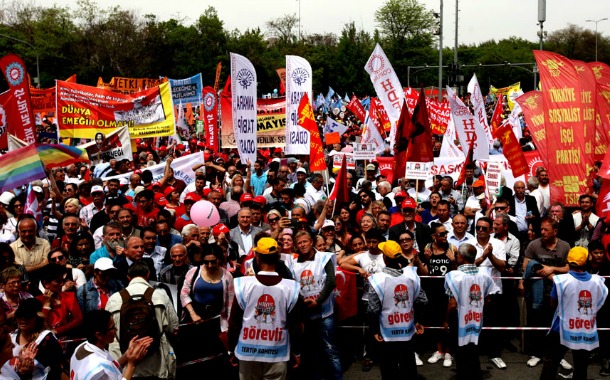Hundreds of thousands of workers mark 1 May International Workers’ Day at rallies in every corner of Turkey. Two weeks after a tainted referendum vote gave President Recep Tayyip Erdoğan near unlimited powers, workers around the country poured onto the streets to demonstrate their continued opposition to his power grab. At the same time, at least 181 people were detained for attempting to celebrate May Day in Taksim Square, the traditional venue in Istanbul for the holiday

Hundreds of thousands of workers mark 1 May International Workers’ Day at rallies in every corner of Turkey. Two weeks after a tainted referendum vote gave President Recep Tayyip Erdoğan near unlimited powers, workers around the country poured onto the streets to demonstrate their continued opposition to his power grab. At the same time, at least 181 people were detained for attempting to celebrate May Day in Taksim Square, the traditional venue in Istanbul for the holiday
Workers around Turkey poured onto the streets in the hundreds of thousands to celebrate May Day, braving a massive police apparatus and a continuing state of emergency that has severely limited the ability to congregate and protest.
Celebrations were held in dozens of provinces and districts to mark International Workers’ Day, with the traditional demands for better labor rights and democracy in the country being supplemented by continued opposition to President Recep Tayyip Erdoğan’s attempt to acquire more power following a tainted constitutional referendum on 16 April.
In Istanbul, the main center of celebration was Bakırköy, where tens of thousands from dozens of parties and platforms celebrated the day, demanding better working conditions, the protection of severances packages, as well as an overturning of the results of the referendum. Alongside slogans concerning labor, tens of thousands frequently chanted, “‘No’ is not finished, the struggle is continuing,” in response to the government’s power grab.
“While the AKP [ruling Justice and Development Party] is off to institutionalize monilithic, authoritarian and fascist policies along with a one-man regime, they are not only trying to restrict and obstruct our fundamental rights and freedoms, but they are trying to eliminate these and institute their own fascist system,” KESK head Lami Özgen said in an address to the crowd.
While the rally in Bakırköy was largely devoid of tension, there were at least 181 detentions near Taksim, as police placed the square, which has resonated with the Turkish left since fascists shot dead at least 34 celebrants on May Day in 1977, under lockdown for the entire day, closing the area to road, metro and sea traffic. In a decision that some observers suggested was a testament to the government’s fear of celebrations in the iconic square, police continued to block the square into the late evening on 1 May, long after May Day rallies generally end.
Earlier in the day, some of the 30,000 police that were deployed in the city for May Day attacked members of the Socialist Party of the Oppressed (ESP), Kaldıraç, Mücadele Birliği, Independent Revolutionary Class Platform (BDSP), Alınteri, İnşaat-İş, Devrimci Duruş, Devrimci Yol Özgürlük and Revolutionary Anarchist Action (DAF) around the Zincirlukuyu Metrobus station, firing tear gas and dragging many detainees along the ground.
A May Day crisis desk reported that 181 people were subsequently detained following the police attacks, although the police reported only 165 such detentions.
Later in the evening, protesters gathered in Kadıköy to demand freedom for those detained.
Rallies elsewhere in the country were also punctuated by grievances over recent state of emergency decrees that have left hundreds of academics without work on allegations that they were either involved in last year’s coup or involved in vaguely defined “terrorist activity.”
During celebrations in Ankara, participants commemorated the martyrs of the 10 October 2015 Islamist massacre before marching to the rally location. Some of the corteges for the rally also featured expelled academics marching together with their students, chanting “The decrees can go, but we’re staying.”
There was similar sentiment in Amed (Diyarbakır), where participants expressed their fury that the houses of some of the academics who were most recently expelled were raided as the rally was occurring.
During the Amed rally, participants saluted Taksim in their slogans while also vowing to resist against the state of emergency and the consequences of last month’s tainted referendum.
Sendika.Org